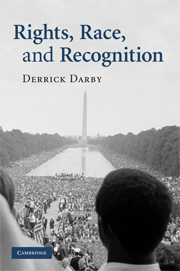Conclusion
Published online by Cambridge University Press: 20 January 2010
Summary
The idea that we have certain natural or presocial moral rights—ones that we possess prior to and independently of all forms of social recognition—has been a powerful resource for arguing against all manner of moral wrongdoing, as we observed in the first two chapters. Some advocates of these rights maintain that the case for believing in them is perhaps strongest when we consider their role in facilitating arguments against one of the most infamous instances of moral wrongdoing, namely black chattel slavery as practiced in the United States of America for well over two hundred years. They claim that this case perhaps more than any other demonstrates the normative value of affirming the existence of rights without recognition. And the worry that we would be rendered unable to argue against slavery in particular and other instances of moral wrongdoing in general, or to argue effectively against them, accounts for why many people will be loath to give up the idea that we possess certain presocial moral rights despite the fact that positing such rights and providing a plausible account of how we come to have them has proven to be far more challenging than is usually supposed, which I argue in chapter 2 by taking on rights internalism and the valid claims approach—the two predominant ways of accounting for how we come to acquire rights without recognition.
- Type
- Chapter
- Information
- Rights, Race, and Recognition , pp. 170 - 178Publisher: Cambridge University PressPrint publication year: 2009

